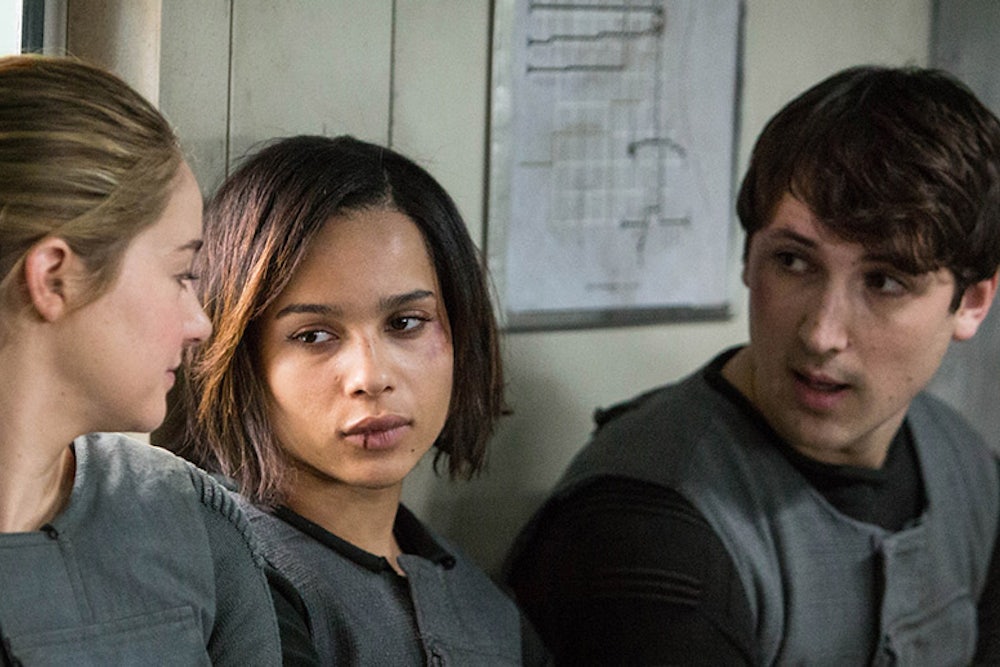Fifteen years. According to a Guardian report, “civilization” as we know it could collapse in 15 years. In a NASA-funded paper, accepted for publication in the journal Ecological Economics, resource depletion, climate change, escalating inequality and the unstoppable greed of the elite are all cited as reasons to imagine why democracy as we know it is time-limited. The study was initially reported uncritically; NASA has since attempted to distance itself from the paper. Yet the countless young people who shared its conclusions on social media seemed to do so with a gloomy shrug, as if their suspicions were merely being confirmed. I was reminded of this while booking tickets for Divergent, the film version of a wildly popular dystopian young adult novel.
It is always worth paying attention to what the kids are reading. Sparkly chauvinist vampires are finally falling out of fashion, with “supernatural romance” giving way to “horrific post-apocalypse dictatorship” as the main refrain of young adult literature. The Hunger Games, thankfully, has killed Twilight. It elbowed aside wilting reactionary female leads literally dying to be abducted by floppy-haired, cold-blooded aristocrats in favour of badass heroines shooting arrows through the heart of post-capitalist patriarchy. What would Katniss Everdeen do with Edward Cullen? The creepy love interest of the Twilight novels would surely find himself staked out at the gates of Panem as a warning about what happens when entitled nobility oversteps itself.
The themes of Divergent, the debut novel of the 25-year-old American author Veronica Roth, are no less exciting for being familiar. A courageous but flawed young girl finds herself at odds with a repressive oligarchy established after an earlier collapse of civilization. She must fight for her survival and that of her people. Along the way, there’s some smooching, moral turpitude and buckets and buckets of blood.
Today’s teens love stories about dystopia and they have plenty of appetite for more. Readers are already eagerly anticipating the next installment of Samantha Shannon’s The Bone Season, starring yet another complex, challenging female lead who is more afraid of her government than any monster. Shannon was a teenager when she began writing it. Veronica Roth was 22 when Divergent was released. That these books are febrile and replete with the rhetorical simplicity of a teenage manifesto only makes their message more compelling: Cinderella as rewritten by CrimethInc to a riot grrrl soundtrack.
Young adult books (and films) are part of a relatively new genre and they speak to the young adult inside us all, the part whose identity is yet unformed, full of rage and fear and longing. They’re not great literature, which is fine, because they’re not designed to be. The new teen dystopias are profoundly romantic, full of doomed crushes and broody heroes in tight athletic suits, but they resist portraying love as the answer to the heroine’s problems. Kissing is fantastic but what Katniss Everdeen, Tris Prior and Paige Mahoney need is someone with pretty eyes to help them bring down the government. Don’t we all?
The stories begin with co-option—with the heroines being forced to compete in the system of violence of which they are unwillingly a part. Why do they do it? Why would any rebellious girl consent to play along, fighting her peers for the amusement of those with power? Because they’ve got her family, of course. A running theme in the new teen dystopias is profound anxiety for the protagonist’s siblings, parents and friends—an individual might be able to escape but they’ll have to leave their loved ones behind. This is an important break with the more conventional young adult device of killing off the family before the story starts. Today’s teen protagonists are worried about how the people they love will manage in the meathook future. They want to know if romance and adventure will still be possible. They want to know if they’ll have the strength to survive.
There are clear reasons why this sort of story is appealing. The complete collapse of the narrative of what a secure future looks like for today’s young people and the grim messages about what the teenagers who grew up with Occupy and austerity have to look forward to as the planet heats up, the job market stutters, pension provision is depleted and the police get meaner have fostered a generational anxiety about how to cope with overmighty state power. These stories function both as manifesto and pressure release valve. They are escapist only in that they allow for the possibility of resistance. The message of The Hunger Games, like the message of The Bone Season, could not be starker: however much they make you fight one another, you must always “remember who the real enemy is.”
The next generation don’t need a NASA-funded study to predict that their adult lives will be harder than those of their parents. Slavoj Žižek, every hipster’s favourite communist philosopher, once opined: “It’s easy to imagine the end of the world … but we cannot imagine the end of capitalism.” I’m not sure that’s true any longer. I suspect that young people today are gradually beginning to imagine what the end of capitalism as we know it might look like—and while it might be exciting, it won’t be a lot of fun and might require some weapons training.
This piece originally appeared on newstatesman.com.
